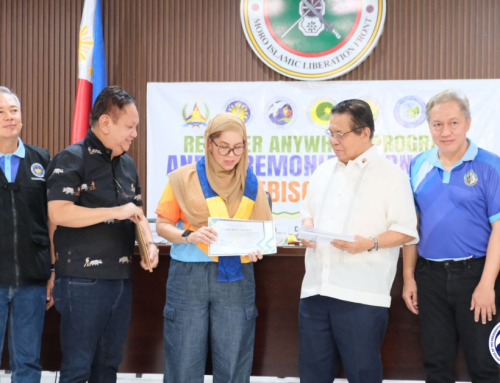GENERAL SANTOS CITY, September 26, 2019 — The Duterte Administration is determined to find a long-lasting solution to the insurgency in the country within its term, according to Presidential Peace Adviser Carlito G. Galvez Jr.
“With the strong leadership and political will of the Duterte administration, we will no longer pass on the Mindanao conflict and local communist armed struggle to our future generations,” Galvez said during the celebration of the National Peace Consciousness Month held here at the Mindanao State University here on Wednesday.
He said President Duterte wants to resolve the insurgency problem before his term ends and not pass it on to the next administration.
“President [Rodrigo] Duterte said before I step down, I would like that peace will reign in our homeland. Let us invest in peace because without peace, there is no development,” he told hundreds of students and professors gathered at the gymnasium here.
Gains in the peace processes
The Duterte Administration has achieved significant milestones in its peace-building efforts halfway through its term.
In the Bangsamoro peace process, the President lived up to his campaign promise of passing the Bangsamoro Organic Law (BOL), a landmark piece of legislation.
The BOL paved the way for the creation of a more powerful Bangsamoro Region in Muslim Mindanao (BARMM) which truly reflects the aspirations of the Bangsamoro people, particularly their desire for genuine autonomy.
For its part, the Moro Islamic Liberation Front (MILF) began the decommissioning of its combatants and weapons last month. Six government-acknowledged camps will also be transformed into peaceful and productive civilian communities.
President Duterte has also engaged the Moro National Liberation Front (MNLF) which signed a final peace agreement with the government in 1996.
MNLF leaders are now members of the Bangsamoro Transition Authority, the interim government of the BARMM.
Under the directive of the President, the Office of the Presidential Adviser on the Peace Process (OPAPP) has created a GPH-MNLF Peace Coordinating Committee which has served as a venue for the national government to dialogue with the group led by its Chairman Nur Misuari and the MNLF’s group led by Yusop Jikiri.
In line with its efforts to put an end to the decades-long communist insurgency, the national government is implementing a “Whole-Of-Nation” Approach under Executive Order No. 70 wherein LGUs will spearhead localized peace engagements in their communities.
The Rebolusyonaryong Partido ng Manggagawa-Pilipinas/ Revolutionary Proletarian Army/ Alex Boncayao Brigade – Tabara-Paduano Group or KAPATIRAN, a communist rejectionist group, also underwent disposition of its combatants and weapons last week which was witnessed by President Duterte.
OPAPP and the former revolutionary group based in the Cordillera have also agreed to create a Joint Evaluation and Monitoring Committee that will keep track of the progress made in the implementation of the peace agreements signed by the parties.
All of these achievements, according to Galvez, is a testament of the Duterte Administration’s desire to bring long-lasting peace in the country.
Peace education key to sustainable peace
Galvez said one way to sustain the gains of the peace process is to institutionalize peace education in schools and universities across the nation.
“But in order to make peace sustainable and enduring, peace education should be part of all academic discourse and humanities,” he said.
Galvez said Peace education “will provide a more mature deliberative concept for our youth and future leaders to solve social divides and controversies.”
“Through peace education, we are also preventing our youth from manipulation and agitations and agents of wrong ideology that has beset Mindanao for centuries. Peace education also teaches people to respect the rule of law and reject all forms of violence,” he said.
He lauded the initiative of the Mindanao State University-General Santos City “for continuously providing the needed academic space for peace education to flourish.”
“Through these efforts, our future generations are being equipped with the necessary tools to handle disputes promote dialogue and understanding the dynamics of conflict, the art of mediation and conflict management, reconciliation and unity which ultimately help put an end to the ‘generational cycle’ of violence in our country,” he said.
The MSU –General Santos City is currently offering a three-unit course on Fundamentals of Peace Education or FPE 101, according to Mishell Lawas, MSU’s Vice-chancellor for academic affairs.
“This proactive response to the pressing need of building peace and harmony in a multicultural Mindanao promotes appreciation of the value of life, human dignity, and respect for religious and cultural diversity necessary in developing them (the youth) as peacebuilders and peace advocates,” she noted.
Youth will take over the peace process
“We are doing all of these to prepare our future generations since they will be the ones who will carry on the challenging task of moving forward the Philippine peace process,” Galvez said.
“Conflict is everywhere. But through peace education, we are moving away from the use of armed struggle as a way to bring about social reforms. This is the concept we want to share and be applied by the next generations of Filipinos as they pursue the path towards enduring peace,” he noted.
“As the President has said, our government is not a product of revolutions but of continuous evolution in governance, aimed at bringing social reforms,” Galvez said.
The peace forum is part of the month-long celebration of this year’s National Peace Consciousness Month. ###












